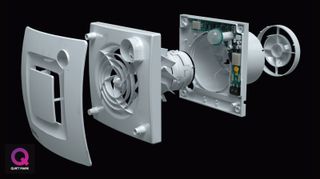器f如何an work? The mechanics of this ventilation basic
These essential fixtures often go unthought of, but perform a vital function in our homes. Here we explain how does an extractor fan work to help you choose and install one in your home

Damp can cause huge problems and needs to be displaced from kitchens and bathrooms – but how exactly how does an extractor fan work?
Mould in rooms with high levels of moisture looks awful, can produce a nasty smell, damage your windows and fixtures, potentially spread across paint, wallpaper, and plaster, and cause respiratory health problems.
That's why it is important to make sure you have thebest bathroom extractor fansinstalled in the appropriate location in your home. But how to assess which extractor fan is the most suitable for your home? Here we look at how they work so you have a better understanding when it comes to making your choice.
器f如何an work?
An extractor fan, also known as an axial-flow fan, operates by creating a flow of air. It consists of a rotating arrangement of vanes or blades, which act on the air.
The rotating assembly of blades and hub is known as an impeller. The fan is usually contained within a housing or case, which can direct the airflow and increase safety by preventing objects from contacting the fan blades.
Most fans are powered by electric motors. When the fan operates, it forces air to move parallel to the shaft about which the blades rotate. This movement of air helps in removing moisture, odours, and other contaminants from a specific area.
Do extractor fans need to vent outside?
Yes, it's crucial for extractor fans, especially those used in domestic settings like bathrooms and kitchens, to vent outside.
Venting outside ensures that the moisture, odours, and other contaminants are effectively expelled from the room or building, preventing issues like mould growth and maintaining good indoor air quality.
For this reason, extractor fans should either be fitted to exterior walls or have ducting to an exterior wall vent.
Do extractor fans use a lot of electricity?
The electricity consumption of an extractor fan depends on its size, power rating, and usage duration. Generally, domestic extractor fans used in bathrooms and kitchens have a relatively low power rating and do not consume a significant amount of electricity when used for typical durations.
However, larger industrial extractor fans or those used continuously for extended periods will consume more electricity.
“It's always a good idea to check the power rating of a specific fan model to get a better understanding of its electricity consumption,” Property expert Paul Gibbens, ofhousebuyers4usays.
Are energy-efficient models less powerful?
Not necessarily. Energy efficiency in extractor fans (or any appliance) refers to the ability to perform a task using less energy.
Paul says anenergy-efficient extractor fan like this one for sale on Amazoncan be just as powerful as a less efficient one; the difference is that it achieves the same airflow or extraction rate while consuming less electricity.
“Advances in motor technology, blade design, and other components have allowed manufacturers to produce powerful fans that are also energy-efficient,” he says.
How often should you clean a bathroom extractor fan?
It's recommended to clean a bathroom extractor fan at least once every 3-6 months. However, the frequency can vary based on usage and the level of dust and humidity in your bathroom. If you notice a decrease in the fan's efficiency or increased noise levels, it might be time for a cleaning.
Property expert Paul Gibbens, ofhousebuyers4u, has put together a list of reasons it is important to knowhow to clean a bathroom extractor fan.
- Improved Efficiency:Over time, dust and grime can accumulate on the fan blades and motor, reducing its efficiency. Cleaning ensures the fan operates at its optimal performance.
- Extended Lifespan:Regular maintenance and cleaning can extend the lifespan of the fan by preventing wear and tear caused by accumulated debris.
- Better Air Quality:Cleaning the fan ensures that it effectively removes moisture and contaminants, maintaining good air quality in the room.
- Reduced Noise: Dust and debris can cause the fan to make more noise. Cleaning can help reduce these noise levels.
- Safety:A clean fan is less likely to become a fire hazard due to accumulated dust or grease.
Get the Homebuilding & Renovating Newsletter
Bring your dream home to life with expert advice, how-to guides and design inspiration, direct to your inbox.
Sam is based in Coventry and has been a news reporter for nearly 20 years. His work has featured in the Mirror, The Sun, MailOnline, the Independent, and news outlets throughout the world. As a copywriter, he has written for clients as diverse as Saint-Gobain, Michelin, Halfords Autocentre, Great British Heating, and Irwin Industrial Tools. During the pandemic, he converted a van into a mini-camper and is currently planning to convert his shed into an office and Star Wars shrine.
Most Popular
Bring your dream home to life with expert advice, how-to guides and design inspiration, direct to your inbox.
Thank you for signing up to Homebuilding. You will receive a verification email shortly.
There was a problem. Please refresh the page and try again.

